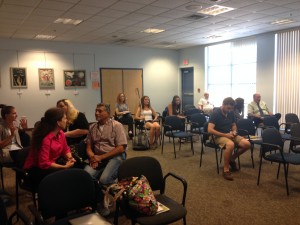If you thought that riding RIPTA, or receiving food benefits was difficult, imagine trying to do it with a disability. That’s what was talked about Tuesday afternoon when the Governor’s Commission on Disabilities held a public forum at the Warwick Public Library, where those in the disabled community could voice their concerns about accessibility across the state.

The forum hosted a number of healthcare professionals, who specialize in a number of care outlets for disabled patients. Different groups that were represented included the Disability Law Center, the National Multiple Sclerosis Society, the Ocean State Center for Independent Living, and the Office of Rehabilitation Services, among others. But, rather than the professionals taking up the time to speak, many community members came forward, expressing how they believe Rhode Island can do better in terms of accessibility.
Barbara Henry, a blind woman who cannot drive, frequents RIPTA, which has proven problematic for her on more than one occasion.
“When the bus pulls up, I have no idea what bus it is,” she said. “They do not announce the bus, and I feel they really discriminate against anyone who is visually impaired, or print disabled, or anything for that matter.”
Henry’s problems have ranged from not knowing that a stop had been changed, to dealing with the newly renovated Kennedy Plaza, which she said is not accessible at all. While the stop names are in braille, the bus numbers that go through those stops are not, and the bus drivers do not announce which bus they are driving.
“My bus stop is G, but my bus number is 33,” she said. “There’s the 33, the 56, and the 54 that go out of that one stop. There’s nothing in braille that indicates that. If you were standing there, I would have to come up to you, and ask, “What bus is this?” And when the bus pulls up, there’s no audio announcement.”
Henry, who advocated, in her own words, “like hell,” for braille at Kennedy Plaza, feels as though her community is not taken seriously. Henry said that she attends the RIPTA community meetings, advocating for other blind people, because there is nothing tactile for them to process when they are finding their stop, not even a map.
“Since it’s been open since January, I’m still trying to process, make a mental map, of where everything is. They didn’t make any type of map or anything,” she said.
When Kennedy Plaza reopened earlier this year, RIPTA staff were there to assist passengers and direct them where to go, but Henry said that there was nobody to specifically help disabled riders.
Henry said that these issues don’t just affect blind people, though. Many other disabled riders struggle with RIPTA, including those who are deaf, autistic, or impaired in some other fashion. Such treatment has lead Henry to believe that RIPTA discriminates against the disabled.
“I truly, truly believe, that they do discriminate against the disabled,” she said. “I feel that my safety is placed at risk.”
Kristin Clark went to the forum to represent her friend, who is disabled and experienced mistreatment and belligerent service at the hands of the Wakefield SNAP office when trying to get certified for her benefits. Clark’s friend, who was not named, went into her local Wakefield office rather than conducting a phone interview with the main Providence office.
“The staff apparently relies on phone interviews, even though they are told they can come into offices to do the recertification,” Clark said. “When she came into the office, she was treated very badly, and very hostilely, and was told several times that SNAP would be cancelled for her, and that she would have to pay back what they said was an overpayment, and now she’s left not knowing what her situation is.”
Clark added that Rhode Island Housing has been helpful for her friend and her son, who is also disabled, because she is part of section 8 housing. SNAP, on the other hand, has caused a whole host of problems for her. Clark has even spoken to Congressman Jim Langevin’s (D- District 2), who looked into the problem and asked that they also speak to the Department of Health. When her friend called, the Department of Health was not only rude to her again, but also defended the SNAP office’s treatment towards her.
“By the end of the call, my friend was just a mess, and as of right now, has no idea what her situation is,” she said. “She does not know if she’s cancelled, she does not know if somebody is going to come after her for that money that they say she was overpaid, she does not know if, come Aug. 1, if she is going to have any SNAP benefits.”
Raffi Jansezian, a staff member for the GCD, explained how their office plans to move forward with these issues.
“After all the forums are done after this week, and after all the transcripts are finalized, I’ll be going through them, personally reading them as well as running different focus groups to analyze the transcripts, to figure out which problems are coming up over and over again,” he said.
Once that process is completed, they then move to begin writing solutions for these pressing issues into legislation, and create laws that can benefit everyone who has been affected and come to them to voice their concerns.
Jansezian added that Governor Gina Raimondo has shown “fantastic” support for the GCD, and that they have already made some strides towards what they hope to accomplish.



